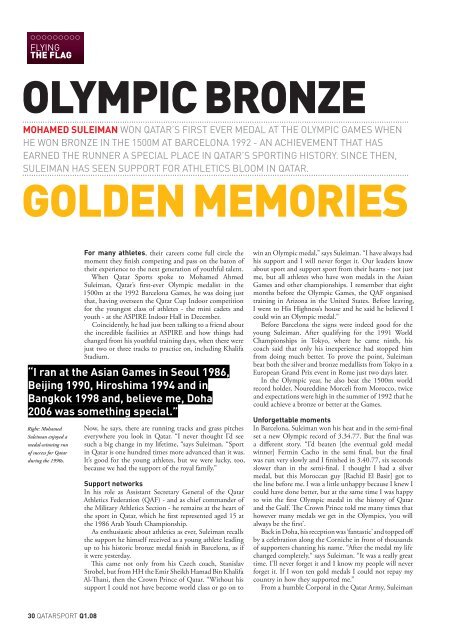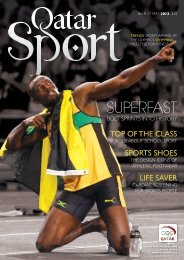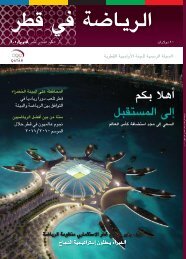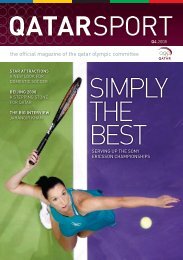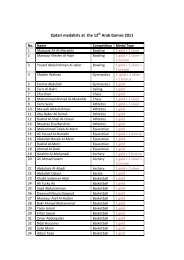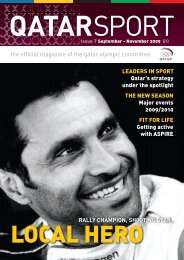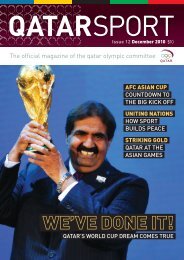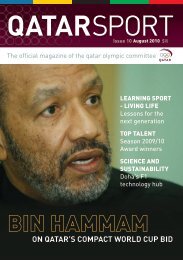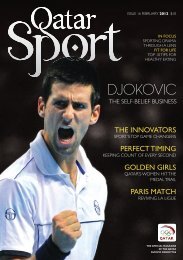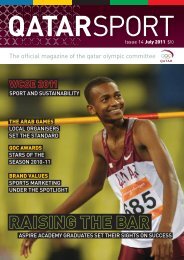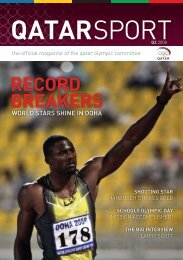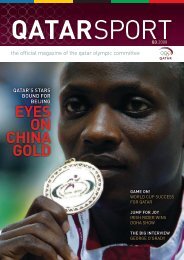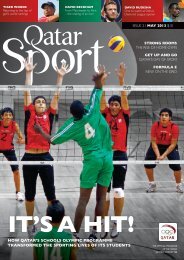JUSTINE EYES DOHA RETURN - Qatar Olympic Committee
JUSTINE EYES DOHA RETURN - Qatar Olympic Committee
JUSTINE EYES DOHA RETURN - Qatar Olympic Committee
Create successful ePaper yourself
Turn your PDF publications into a flip-book with our unique Google optimized e-Paper software.
o o o o o o o o o<br />
flying<br />
the flag<br />
<strong>Olympic</strong> bronze<br />
Mohamed Suleiman won <strong>Qatar</strong>’s first ever medal at the <strong>Olympic</strong> Games when<br />
he won bronze in the 1500m at Barcelona 1992 - an achievement that has<br />
earned the runner a special place in <strong>Qatar</strong>’s sporting history. Since then,<br />
Suleiman has seen support for athletics bloom in <strong>Qatar</strong>.<br />
Golden memories<br />
Right: Mohamed<br />
Suleiman enjoyed a<br />
medal-winning run<br />
of success for <strong>Qatar</strong><br />
during the 1990s.<br />
For many athletes, their careers come full circle the<br />
moment they finish competing and pass on the baton of<br />
their experience to the next generation of youthful talent.<br />
When <strong>Qatar</strong> Sports spoke to Mohamed Ahmed<br />
Suleiman, <strong>Qatar</strong>’s first-ever <strong>Olympic</strong> medalist in the<br />
1500m at the 1992 Barcelona Games, he was doing just<br />
that, having overseen the <strong>Qatar</strong> Cup Indoor competition<br />
for the youngest class of athletes - the mini cadets and<br />
youth - at the ASPIRE Indoor Hall in December.<br />
Coincidently, he had just been talking to a friend about<br />
the incredible facilities at ASPIRE and how things had<br />
changed from his youthful training days, when there were<br />
just two or three tracks to practice on, including Khalifa<br />
Stadium.<br />
“I ran at the Asian Games in Seoul 1986,<br />
Beijing 1990, Hiroshima 1994 and in<br />
Bangkok 1998 and, believe me, Doha<br />
2006 was something special.”<br />
Now, he says, there are running tracks and grass pitches<br />
everywhere you look in <strong>Qatar</strong>. “I never thought I’d see<br />
such a big change in my lifetime, “says Suleiman. “Sport<br />
in <strong>Qatar</strong> is one hundred times more advanced than it was.<br />
It’s good for the young athletes, but we were lucky, too,<br />
because we had the support of the royal family.”<br />
Support networks<br />
In his role as Assistant Secretary General of the <strong>Qatar</strong><br />
Athletics Federation (QAF) - and as chief commander of<br />
the Military Athletics Section - he remains at the heart of<br />
the sport in <strong>Qatar</strong>, which he first represented aged 15 at<br />
the 1986 Arab Youth Championship.<br />
As enthusiastic about athletics as ever, Suleiman recalls<br />
the support he himself received as a young athlete leading<br />
up to his historic bronze medal finish in Barcelona, as if<br />
it were yesterday.<br />
This came not only from his Czech coach, Stanislav<br />
Strobel, but from HH the Emir Sheikh Hamad Bin Khalifa<br />
Al-Thani, then the Crown Prince of <strong>Qatar</strong>. “Without his<br />
support I could not have become world class or go on to<br />
win an <strong>Olympic</strong> medal,” says Suleiman. “I have always had<br />
his support and I will never forget it. Our leaders know<br />
about sport and support sport from their hearts - not just<br />
me, but all athletes who have won medals in the Asian<br />
Games and other championships. I remember that eight<br />
months before the <strong>Olympic</strong> Games, the QAF organised<br />
training in Arizona in the United States. Before leaving,<br />
I went to His Highness’s house and he said he believed I<br />
could win an <strong>Olympic</strong> medal.”<br />
Before Barcelona the signs were indeed good for the<br />
young Suleiman. After qualifying for the 1991 World<br />
Championships in Tokyo, where he came ninth, his<br />
coach said that only his inexperience had stopped him<br />
from doing much better. To prove the point, Suleiman<br />
beat both the silver and bronze medallists from Tokyo in a<br />
European Grand Prix event in Rome just two days later.<br />
In the <strong>Olympic</strong> year, he also beat the 1500m world<br />
record holder, Noureddine Morceli from Morocco, twice<br />
and expectations were high in the summer of 1992 that he<br />
could achieve a bronze or better at the Games.<br />
Unforgettable moments<br />
In Barcelona, Suleiman won his heat and in the semi-final<br />
set a new <strong>Olympic</strong> record of 3.34.77. But the final was<br />
a different story. “I’d beaten [the eventual gold medal<br />
winner] Fermin Cacho in the semi final, but the final<br />
was run very slowly and I finished in 3.40.77, six seconds<br />
slower than in the semi-final. I thought I had a silver<br />
medal, but this Moroccan guy [Rachid El Basir] got to<br />
the line before me. I was a little unhappy because I knew I<br />
could have done better, but at the same time I was happy<br />
to win the first <strong>Olympic</strong> medal in the history of <strong>Qatar</strong><br />
and the Gulf. The Crown Prince told me many times that<br />
however many medals we get in the <strong>Olympic</strong>s, ‘you will<br />
always be the first’.<br />
Back in Doha, his reception was ‘fantastic’ and topped off<br />
by a celebration along the Corniche in front of thousands<br />
of supporters chanting his name. “After the medal my life<br />
changed completely,“ says Suleiman. “It was a really great<br />
time. I’ll never forget it and I know my people will never<br />
forget it. If I won ten gold medals I could not repay my<br />
country in how they supported me.”<br />
From a humble Corporal in the <strong>Qatar</strong> Army, Suleiman<br />
30 <strong>Qatar</strong>Sport Q1.08


